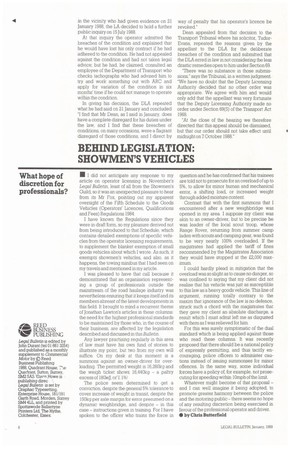BEHIND LEGISLATION: SHOWMEN'S VEHICLES
Page 94

If you've noticed an error in this article please click here to report it so we can fix it.
What hope of discretion for professionals?
• I did not anticipate arty response to my article on operator licensing in November's Legal Bulletin, least of all from the Showmen's Guild, so it was an unexpected pleasure to hear from its Mr Fox. pointing out my apparent oversight of the Fifth Schedule to the Goods Vehicles (Operators' Licences, Qualifications and Fees) Regulations 1984.
I have known the Regulations since they were in draft form, so my pleasure derived not from being introduced to that Schedule, which contains detailed exemptions of specific vehicles from the operator licensing requirements, to supplement the blanket exemption of small goods vehicles about which I wrote. As such, it exempts showmen's vehicles, and also, as it happens, the towing minibus that I had seen on my travels and mentioned in my article.
I was pleased to have that call because it demonstrated that an organisation representing a group of professionals outside the mainstream of the road haulage industry was nevertheless ensuring that it keeps itself and its members abreast of the latest developments in this field. It brought to mind a recurrent theme of Jonathan Lawton's articles in these columns: the need for the highest professional standards to be maintained by those who, in the course of their business, are affected by the legislation described and discussed in this Bulletin.
Any lawyer practising regularly in this area of law must have his own fund of stories to illustrate my point, but two from my own will suffice. On my desk at this moment is a summons against an owner-driver for overloading. The permitted weight is 16,260kg and the weigh ticket shows 16,440kg a paltry excess of 18014, or'1.1%!
The police seem determined to get a conviction, despite the general 5% tolerance to cover increase of weight in transit, despite the 150kg per axle margin for error presumed on a dynamic weighbridge, and despite in this case-. instructions given in training. For I have spoken to the officer who trains the force in
question and he has confirmed that his trainees are told not to prosecute for an overload of up to 5%, to allow for minor human and mechanical error, a shifting load, or increased weight through added moisture content.
Contrast that with the first summons that I encountered after a new weighbridge was opened in my area. I suppose my client was akin to an owner-driver, but to be precise he was leader of the local scout troop, whose Range Rover, returning from summer camp laden with scouts and camping gear, was found to be very nearly 100% overloaded. If the magistrates had applied the tariff of fines recommended by the Magistrates Association they would have stopped at the £2,000 maximum.
I could hardly plead in mitigation that the overload was so slight as to cause no danger, so was confined to saying that my client did not realise that his vehicle was just as susceptible to this law as a heavy goods vehicle. This line of argument, running totally contrary to the maxim that ignorance of the law is no defence, struck such a chord with the magistrates that they gave my client an absolute discharge, a result which I must admit left me as disgusted with them as I was relieved for him.
For this was surely symptomatic of the dual standard which is being applied against those who read these columns. It was recently proposed that there should be a national policy of expressly permitting, and thus tacitly encouraging, police officers to administer cautions instead of issuing summonses for minor offences. In the same way, some individual forces have a policy of, for example, not prosecuting for speeding within lOmph of the limit.
Whatever might become of that proposal and I can well imagine it being adopted, to promote greater harmony between the police and the motoring publicthere seems no hope of any resulting discretion being exercised in favour of the professional operator and driver.
• by Chris Butterfield
































































































